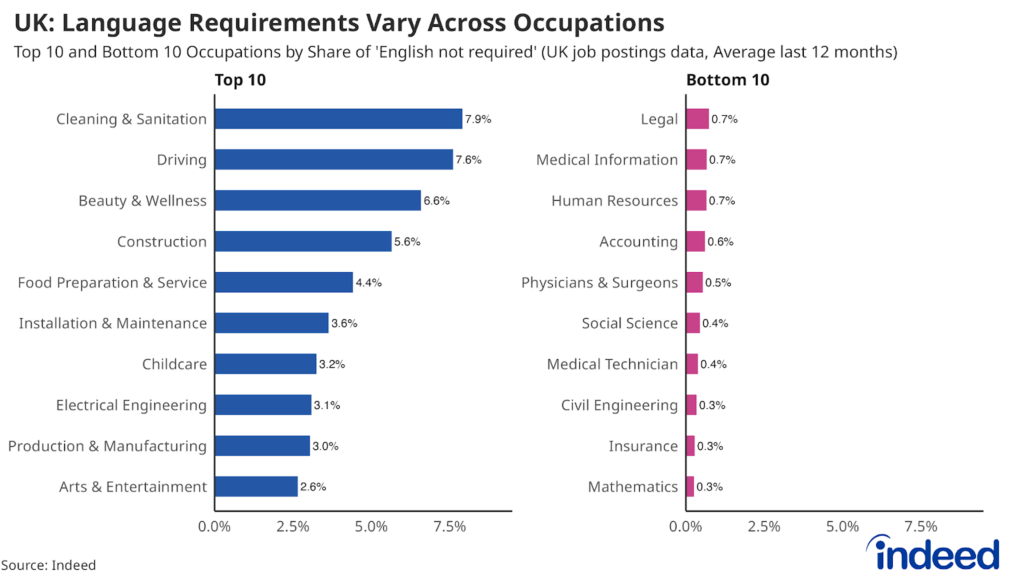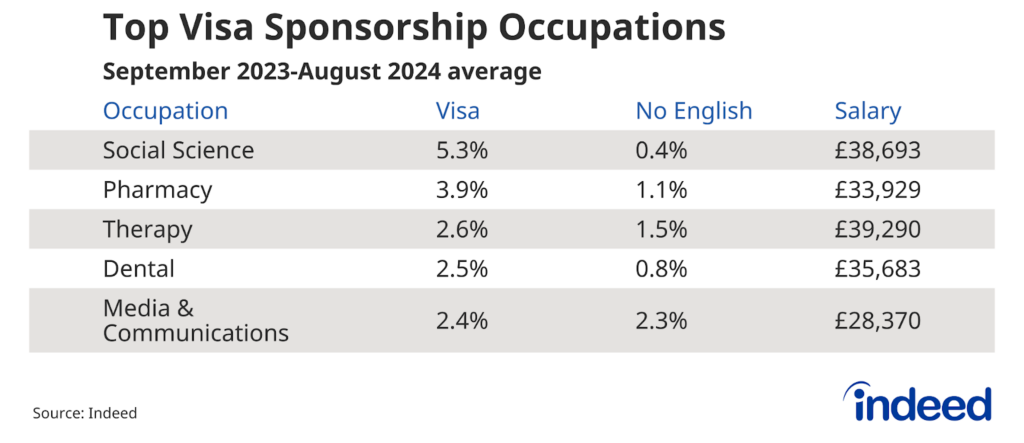New data from hiring platform, Indeed, signals some openness from UK employers to hiring migrant workers, with flexible local language requirements in some lower paid occupations. “English not required” is explicitly stated in almost 3% (2.8%) of job postings, with the share of no language requirements highest in lower paid jobs in Cleaning & Sanitation (7.9%), Driving (7.6%), and Beauty & Wellness (6.6%).
Despite some language flexibility in certain lower paid sectors, the UK lags behind other European countries in willingness to hire workers without local language skills. The Netherlands has the largest share of postings that do not require knowledge of Dutch (7.8%), followed by Spain (5.8% do not require Spanish). For Italy and France, the share of their respective main official languages is around 4%, while Germany is close to the UK at 2.7%.
English optional in some sectors
Sectors with high and low shares of job postings open to non-native speakers represent a broad cross-section of the UK labour market. While those roles with more flexible language requirements tend to be in lower paid industries, typically higher paid jobs in Mathematics, Insurance and Civil Engineering are the most stringent, with only 0.3% of postings explicitly not requiring English.

Foreign workers already make up a percentage of many of the categories with the highest share of “English not required” postings, signalling less need for new hires to speak English in environments where many colleagues were born abroad.
In 2023, foreign-born workers accounted for 27% of employment in elementary cleaning occupations, 29% in road transport driving, 24% in hairdressing and related services, and 36% in food preparation and hospitality trades, according to our analysis of the UK Labour Force Survey.
Visa sponsorship trends as UK struggles to attract highly skilled workers
While flexible language requirements may help to attract lower skilled workers, visa sponsorship offers have become an increasingly important way to hire highly skilled migrants post-Brexit. However, despite recent research from the Indeed Hiring Lab suggesting that the UK is falling behind other large Western countries when it comes to attracting highly skilled foreign workers, only 0.5% of job postings explicitly offer visa sponsorship.
Some occupations, including Social Science (5.3%) and Pharmacy (3.9%), have high visa shares but low “English not required” shares. These occupations tend to be among those eligible as listed on the UK’s Skilled Worker Salary Inmigration list and/or the Health and Care Worker list.

Jack Kennedy, Senior Economist at Indeed, commented: “Language requirement shares reflect deep trends in labour markets that are important to understanding migration. Employers may be using flexibility with English language skills as a signal for willingness to hire foreign workers.
“While most migrants to the UK speak English or tend to eventually learn it, it’s important to note that clusters of foreign workers in certain regions and industries might delay learning the local language until after they begin working. And in large cities like London, some migrant workers might easily live and work for decades without ever speaking the local language. It’s therefore encouraging to see willingness from employers in certain industries to hire workers without English language skills which could help drive thriving workforces in lower paid sectors.
“However, with our recent research showing that the UK is struggling to attract higher skilled workers from abroad relative to other European countries, the low level of visa sponsorship offers could signal there’s still some way to go to see a boost of foreign talent in higher paid and skilled industries.”
Over the next six months, Indeed will host a series of job fairs throughout Europe to help refugees and jobseekers facing barriers find work. To find out more visit: https://jobfairs.indeed.com/.

